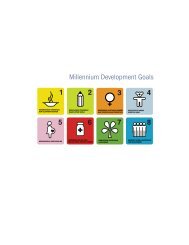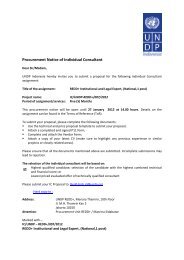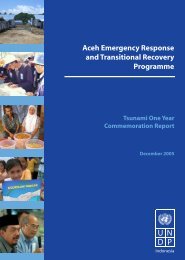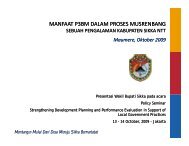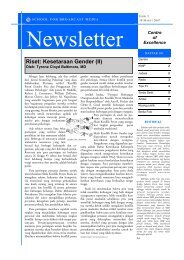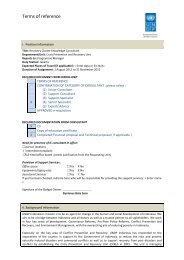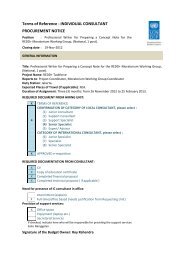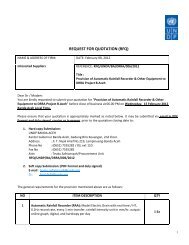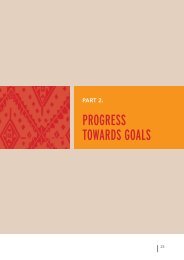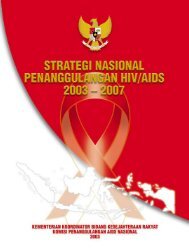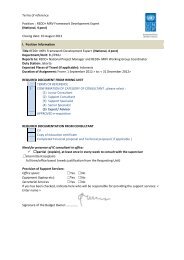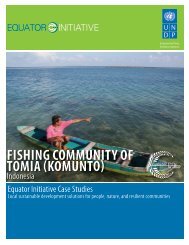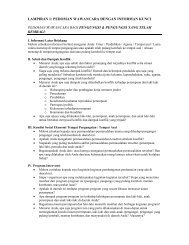Papua Needs Assessment - UNDP
Papua Needs Assessment - UNDP
Papua Needs Assessment - UNDP
You also want an ePaper? Increase the reach of your titles
YUMPU automatically turns print PDFs into web optimized ePapers that Google loves.
6.2 Post-needs assessment support to <strong>Papua</strong><br />
Following the <strong>Papua</strong> <strong>Needs</strong> <strong>Assessment</strong>, a programme has been initiated with the Regional<br />
Planning Agency (BP3D) and kabupaten governments for capacities to help effectively prepare<br />
medium and long-term development plans identified through the PNA. Use of the PNA findings,<br />
and in particular the Synthesis Team’s documentation of the development gap, has been<br />
instrumental in revitalising local planning activities. During this period, a framework for long-term,<br />
comprehensive support for developing capacities to achieve the MDGs and support improvements<br />
in human development in <strong>Papua</strong> has also been developed in consultation with local stakeholders<br />
and selected development partners. This programme, called <strong>Papua</strong> 2015, provides a clear structure<br />
for coordinated and harmonised development assistance activities to support the <strong>Papua</strong>n<br />
government’s priorities and plans. Under this structure, the <strong>UNDP</strong> will specialise in general<br />
coordination, facilitation of multi-stakeholder processes and policy dialogue, while working with<br />
other UN agencies and donor partners that take advantage of their technical expertise in specific<br />
MDG-related issue areas.<br />
The underlying premise is that by helping to develop local capacities and facilitate cooperation<br />
between government, civil society and external development partners more sustainable and<br />
equitable progress toward human development can be achieved. This includes simultaneously<br />
strengthening the capacity of non-state actors working at the community level and of the local<br />
government, from the Provincial level to the district (kecamatan) level. By developing the capacities<br />
of local state and non-state actors, those actors who have the local contextual knowledge will be<br />
empowered to provide and influence future development initiatives. With this in mind, a combination<br />
of diverse technical assistance and other resources to local governments, civil society actors,<br />
academia and communities must be considered in future programming.<br />
6.2.1 Strengthening local capacities<br />
The successful implementation of OTSUS and the achievement of <strong>Papua</strong>’s development vision<br />
requires the development of key capacities within local government and civil society to formulate<br />
and implement appropriate, locally-specific and targeted development programme in the subregions<br />
of <strong>Papua</strong>. Although kabupaten and district governments are making important adjustments<br />
in planning, operations, budgeting and staffing during the reform transition to ensure that the<br />
continued provision of public services, capacity is still far from adequate to achieve operational<br />
efficiency in OTSUS and related developmental programmes. Specifically capacities that will<br />
bring about key, strategic changes and improvements in <strong>Papua</strong> are the following:<br />
• Policy development and operational planning (including budgeting);<br />
• Implementation or delivery of basic services in locally-effective ways; and<br />
• Monitoring and evaluation of development processes, to improve policy, planning, budgeting<br />
and service delivery (both government and civil society have responsibilities in these<br />
areas).<br />
The PNA has shown that improvement in the data on the MDG-related sectors is necessary to<br />
support the planning, monitoring, and evaluation of programs that are intended to make progress<br />
toward the MDGs. Improving data mechanisms and quality will enable more responsive planning<br />
and allocation of resources to the sectors and administrative areas with most need, and will<br />
support improved practices in monitoring and evaluation of local (and donor-supported) development<br />
policies and expenditure.<br />
Equally critical to the functions outlined above are improvements in financial management systems,<br />
including the systems and skills that enable greater transparency in budget allocations, transfer<br />
27



